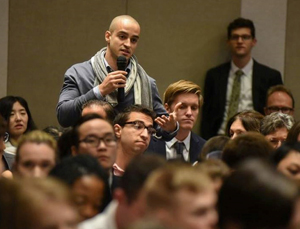Participating in the fifth annual Back-to-School Event hosted by the Council on Foreign Relations.
Back-to-School Event at the Council on Foreign Relations

Gabriel Hardy is pictured with microphone in hand.
More than a dozen Adelphi students from the Political Science Department, the International Studies Program and the Levermore Global Scholars Program were excited to participate in the fifth annual Back-to-School Event hosted by the Council on Foreign Relations on October 10th, which focused on the Sunni-Shi’a sectarian divide.
The Council on Foreign Relations (CFR) is one of the most renowned foreign policy think tanks in the world, and for this event the CFR invited authors Deborah Amos (correspondent for National Public Radio) and Vali R. Nasr (Dean at Johns Hopkins University) to be guest speakers. After viewing the newest CFR interactive documentary on this topic, these two experts discussed sectarianism and how it is influencing the conflict in Syria and across the Middle East.
One of the things that stayed with me the most was when Nasr said “Identity is part of politics.” Both Nasr’s academic research and Amos’ field research in Syria, and other Middle Eastern countries, find that sectarian identity is very hard to remove from politics. This is largely due to how citizens seek social support and safety within their relative sectarian communities, which is not so different from that in other countries. Nasr alluded that the only reason other countries do not have such blatant divisions is because concrete state institutions serve as a barrier to the radicalization we see today. Politics then turns into a zero-sum game between the Sunnis and Shias because being in the religious minority group means being a political minority. With no credible state institutions to protect them, people fear spillover into the neighboring countries.
As Amos said, “Regional competition drives domestic politics.” Both minorities and majorities approach governance in sectarian terms. Other Arab countries are fearful that whichever sect becomes the majority in Syria will have implications for the sectarian balance in their countries. This essentially became the biggest takeaway from this amazing CFR discussion: everything is connected. To separate religion and politics is to remove identities and the recognition they have cultivated over centuries. To remove outside involvement in the Middle East further perpetuates this problem.
Students were able to ask probing questions of the panelists, and Gabriel Hardy from Adelphi was one of the lucky few who managed to get his question asked. It was a stimulating discussion and we came away with a greater understanding of the interconnectedness of national policy choices.
For further information, please contact:
Todd Wilson
Strategic Communications Director
p – 516.237.8634
e – twilson@adelphi.edu